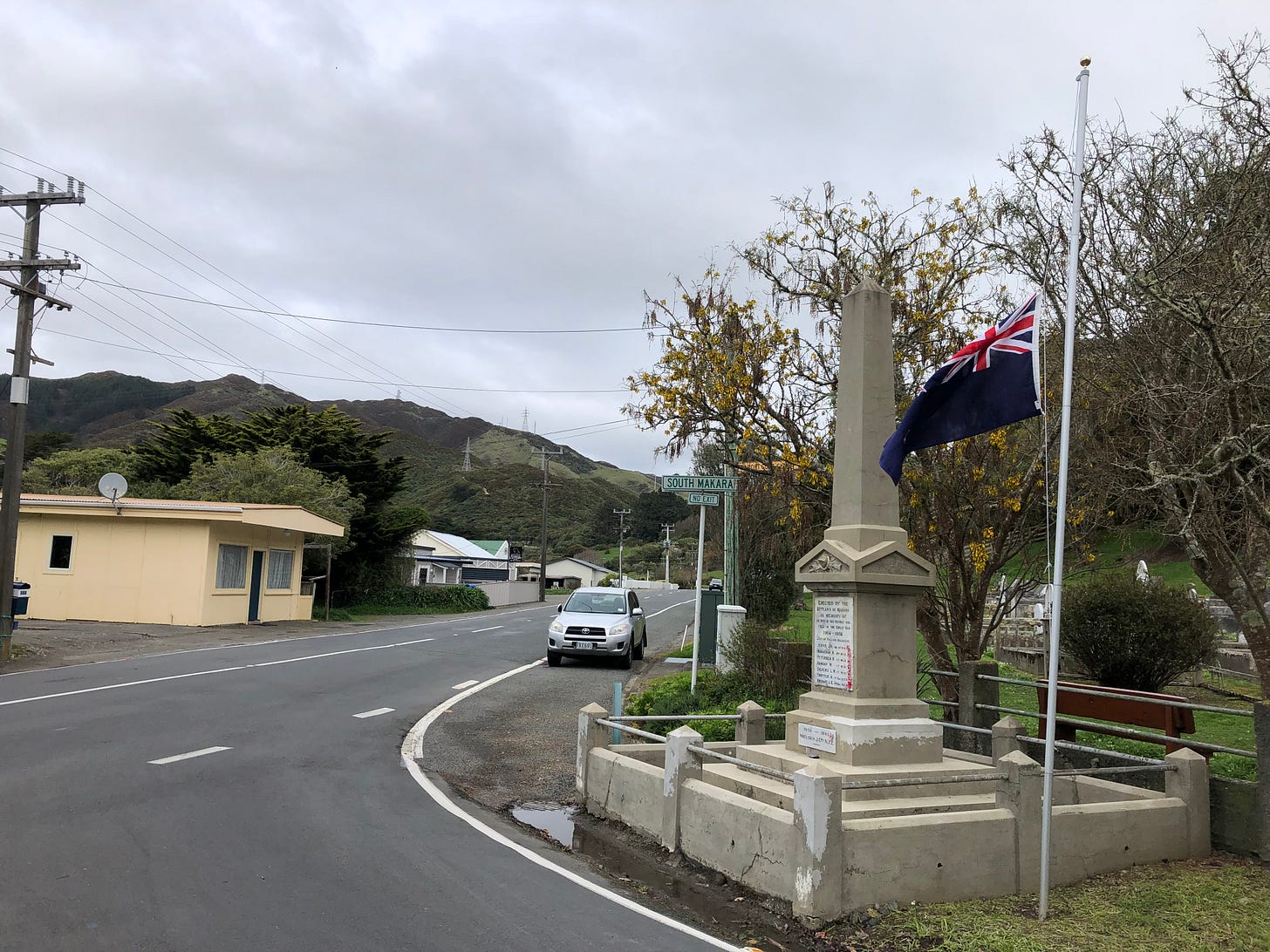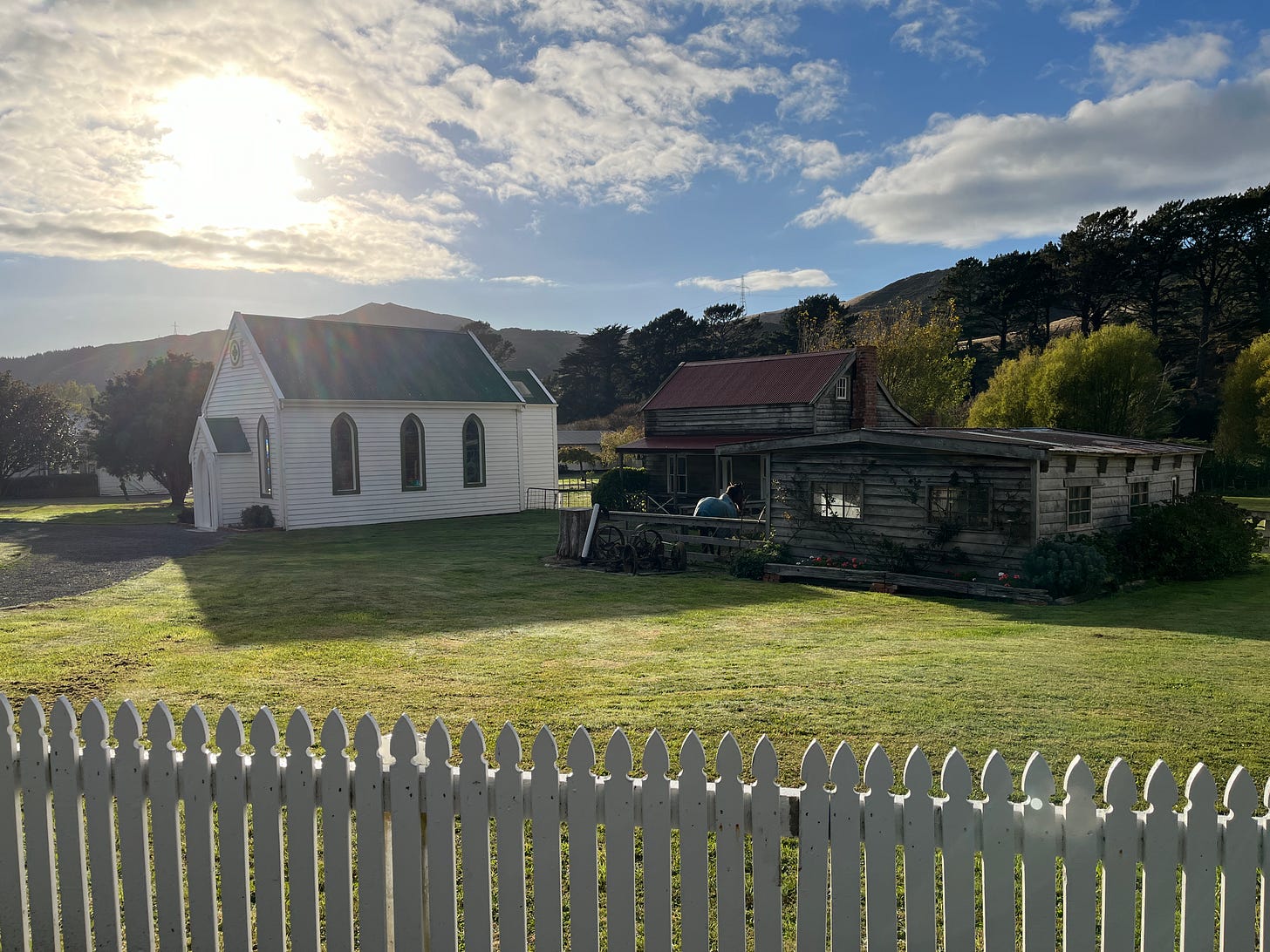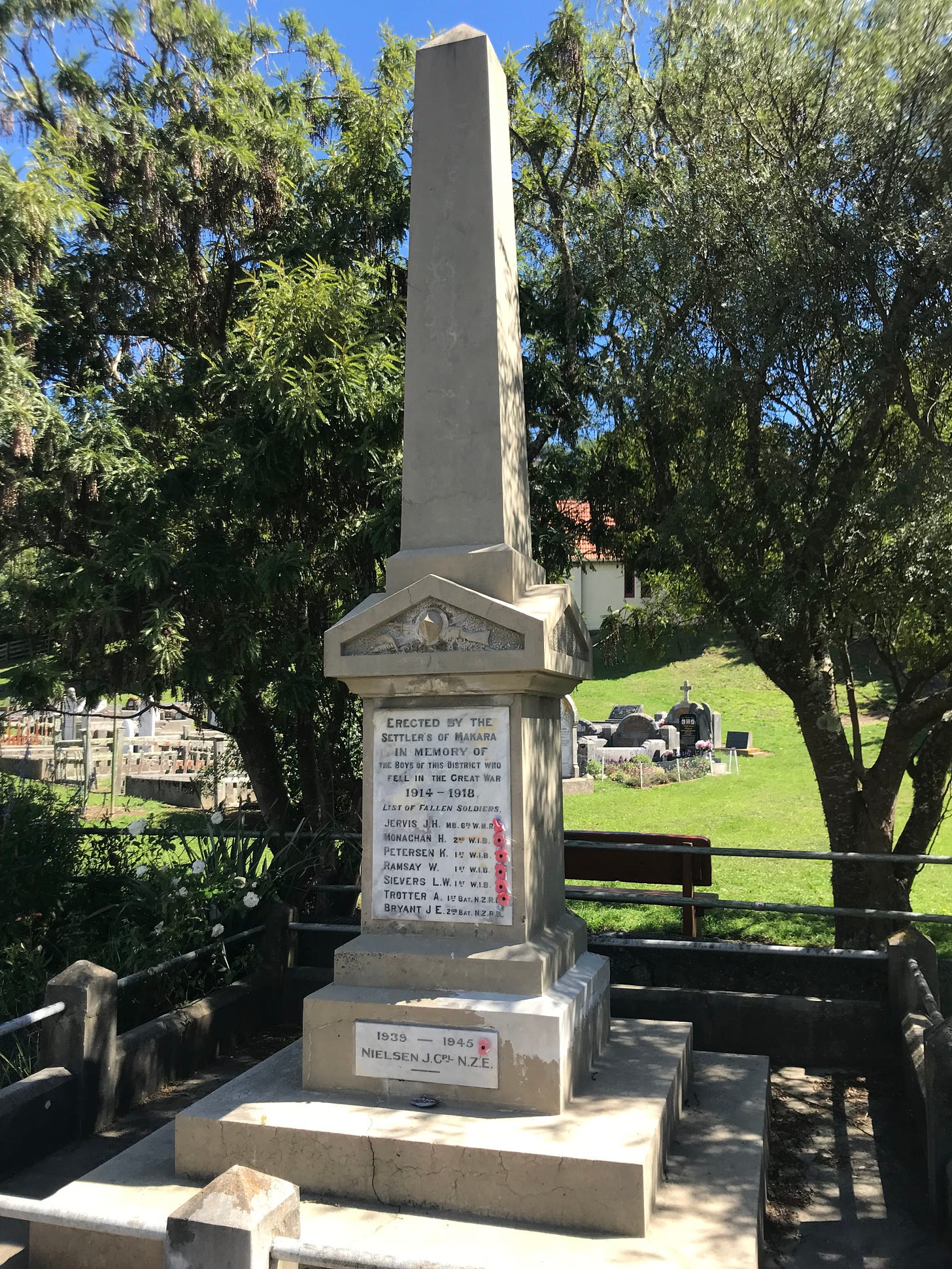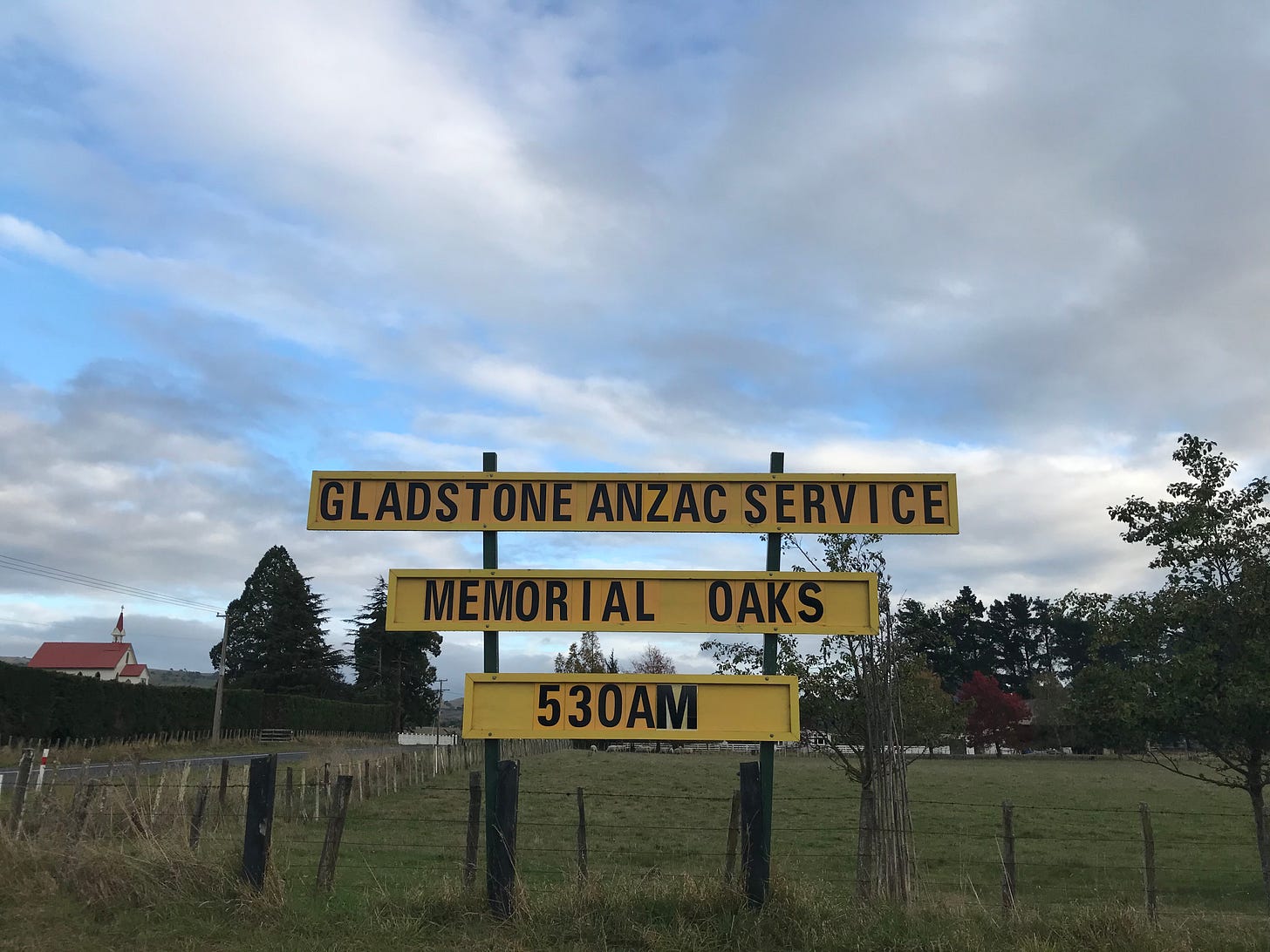It’s a twisting downhill drive with plenty of chunky roadkill, but if you’re in Karori and have a spare ten minutes, take the turning towards Mākara. You’ll be glad you did, especially if it’s Anzac Day.
Nobody honours the Anzacs better than our smallest, blink-and-you’ll-miss-them country settlements. You know the ones, with a smattering of houses and maybe a crossroads. They’ve perhaps a dozen names on their war memorial. Their tiny school will have one of those plain but wonderful concrete pools, and there’s likely to be a weatherboard community hall somewhere, with a hidden key for those in the know.
The big cities have floodlights and digital screens at their dawn services, the immaculate rows of soldiers and the dignitaries, with all the attendant rigour and ceremony. These are emotional as well as impressive remembrances of war, but somehow, it’s in the tiny places where you really feel the cost.
Settlements like Mākara - with its dramatic hills and exposed tops, swamp grass and pine forest, its lines of fence along impossible ridges, its feral goats and distant sheep - could least afford to lose their youth, early in the old century. But lose them they did, and bravely kept on.
I drive this road most days, so I know its narrows. I see wild turkeys and free-ranging chickens pecking in the verges, goats moving in the bush, hawks up in lazy circles, Pūkeko, rabbits and Pedro, the stubby white horse, usually at the fence beside his mates at Pony Club. There are logging trucks groaning uphill to the city and sometimes wide-load flat-beds, carrying turbine equipment to and from the wind farm north of the valley. They’re intimidating, and I pull over to avoid them.
This is the route to the only graveyard still accepting the dead in Karori, as the main cemetery no longer has room. It’s common, then, to see a funeral cortege winding its way down to the flat - a gleaming hearse, followed by several cars of mourners - and I’ll often have to join them (slowly, respectfully) until they turn into the cemetery gate. Later, I might follow the empty hearse back to the city and wonder what music the driver might be listening to, now he’s on his own.
I’ve quite the school run.
Anzac Day this year was newsworthy in Wellington for high winds, which cancelled the national remembrance service at Pukeahu. I hoped we’d have more shelter at the annual Mākara ceremony. The gale howled around the car as we left Karori and rounded the uppermost point of Mākara Road, but I reasoned this might be the worst of it. After this bend you drop gently into the valley, descending through a band of mist on wet days, and usually the drama of the elements softens into calm.
The views go from wild to charming. Mākara hall with its pretty shrubbery; the miniature church whose door seems always unlocked; the old settler cottage and its stable; what used to be a tiny service station, and a former shop, all lined up along a ribbon of country road which will eventually cross an eel stream by the school. Truly it’s like a film set, or a perfect diorama of old-time rural New Zealand, yet it’s only a few minutes from the bustle of Karori Road.
No luck with the weather today; the hills are offering no protection. As we leave the car, a gust tears the poppy off my daughter’s shirt.
The wind will also challenge the speakers at the 10am ceremony, which is held on the road itself beside the war memorial. It roars in the nearby trees, which are swaying almost dangerously. The flag is angrily snapping, making it difficult for the schoolboy lowering it to half-mast.
As this is the only route to this settlement, extending beyond the homes in this valley to Mākara Beach and even as far as Johnsonville, it isn’t practical to close this road. Every few minutes a car is ushered through the middle of things. Most drivers have enough sense of occasion to look ashamed about distracting us. One passenger shields his face from view with his hand.
But this year there are fewer cars, probably because the wind is putting off day-trippers to the beach, and so it’s still possible to lose yourself in the solemn words and sorrowful music. A young piper performs in full Scots regalia, though sensibly not in his Glengarry hat, in case the wind ripped it off. A naval captain speaks; two boys from Mākara School recite a poem; a chaplain traces a crucifix in the air. The young Pony Club riders contribute, with facts about horses in war. They place a wreath of soldered horseshoes at the base of the memorial.
Across the road a row of farmworkers, possibly from the sprawling nearby sheep station, are watching the ceremony in their work-gear and boots. One yawns extravagantly. He’s exhausted, but he’s here.
When we sing the national anthem, I can only hear the voices closest to me. The service is over and the piper will play us off. We straggle down to the hall where the locals have put on a proper morning tea. Pikelets piled high with cream; cakes, slices and rolls, two urns of hot water for tea-drinkers, a little dish of spoons and a porcelain jug of milk. The kids tuck in and the adults queue for drinks.
Most of us stand as we sip tea and talk. There are chairs dotted about if anyone needs relief. Eventually I sit down, as one of my legs has pins and needles after half an hour standing in city-style boots. Someone has placed rosemary for remembrance on each table. A smiling host passes us with a tray of tiny glasses and asks, “Port?”
I’d have loved one but with kids in the back, my stupid boots and high winds to contend with on the way home, I may have driven into a hedge.
Later, back in Karori, I take the dog around the block. I fall into step beside a neighbour on his way to the RSA, a deck of medals on his chest and his army beret cocked at an angle. He told me he’d taken his basset hound to the dawn service, but the dog had bayed throughout the ceremony. “Even when I held his muzzle shut,” he said. We parted ways at Karori Road and inadequately, I said of it all: “Well, thank you.”
It was nearly midday, but Campbell Street was deserted. It’s a lovely street, with pretty workers’ cottages and gardens of blowsy flowers, and walking along it on an unusually quiet day like this - no cars, no people - this could have been 1920, or 1950.
A piece of sponge cake, a modest glass of spirits, a bud vase of flowers - what a relief these small pleasures must have been for the men and women who’d survived the worst. How blessed the boredom of this ordinary suburb and welcome, the calm.
*Where are the darned macrons? Finer minds than mine might know.
**Thanks to help from lovely readers, I’ve now added macrons!






Gorgeous, Leah. I'd welcome a bit of calm right now - I think we all would. Is it bad that I teared up at the mention of horses in the war? I remember reading War Horse to Ruby and I often had to stop to choke down the tears.
It has been a while since we went to Makara, but now we have moved to Karori there is really very little excuse. What a lovely post and so glad I stumbled upon your substack.